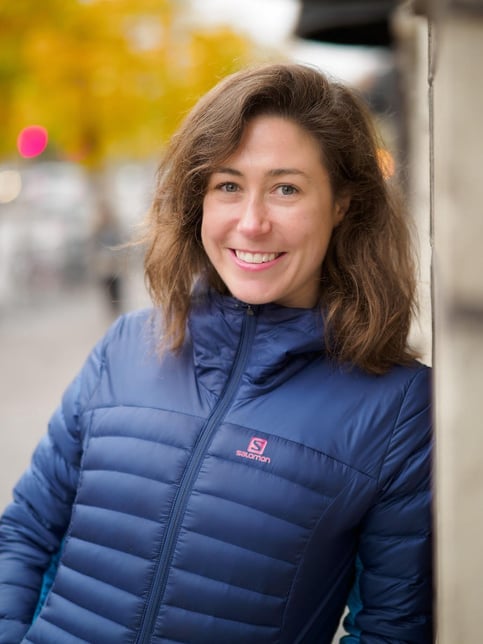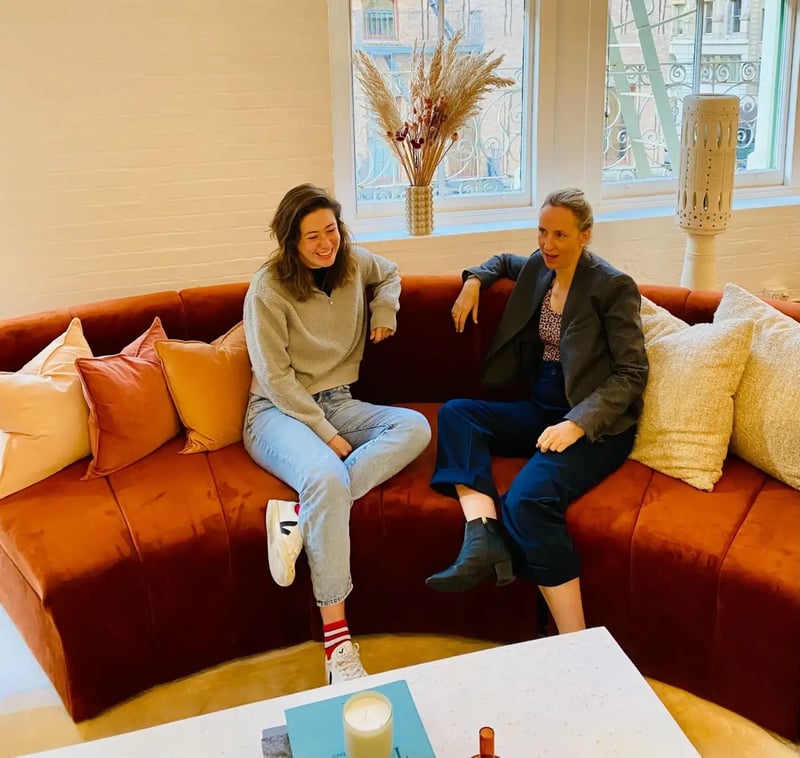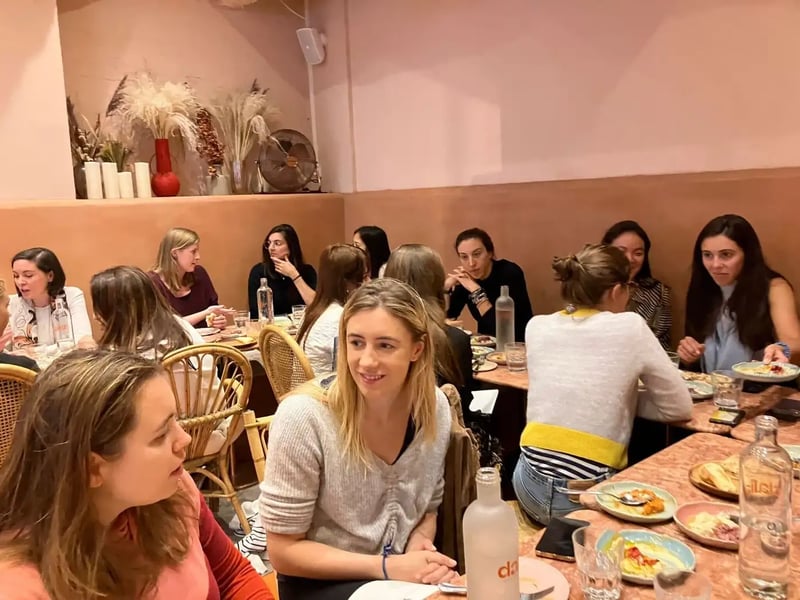Sophie Winwood on Fintech, VCs, & Passion for Inclusion & Empowerment

Discovering, evaluating, and executing early-stage FinTech and InsurTech investments is the name of the game for Sophie Winwood. As an Investment Principal at Anthemis Group, she also supports current portfolio companies.
Sophie co-founded WVC:E (Women in Venture Capital: Europe), an organization that promotes the inclusion, empowerment, and integration of venture capital in Europe. In 2022, WVC:E launched its inaugural one-day Women in Venture Capital Europe Summit at Station F in Paris, an event that brought together 350+ attendees and 55+ speakers from across Europe. Today, the organization’s thriving community is made up of over 500 women.
We spoke with Sophie to learn more about her career path, how she got started as a VC investor, and her long-term goals.
The origins of Sophie Winwood’s VC career
HubSpot for Startups: What initially sparked your interest in finance and investing?
Sophie: I studied biochemistry at the university, which really has nothing to do with financing or investing. I thought I wanted to change the world by curing cancer, but I found being in a lab really lonely and I was TERRIBLE at pipetting. However, both my parents owned their own businesses growing up, so I had always been around entrepreneurs. So, I did the thing everyone does when they don’t know what to do after graduation — I joined Deloitte to do auditing, which I really didn’t enjoy and quickly moved into mid-market M&A (mergers and acquisitions) in banking and specialty finance. While I was there, I worked on one FinTech and one InsurTech deal and was like, “Cool, this is the future, I want to base my career on this.” After an amazing time at Innovate Finance, the industry body for UK FinTech, (where I was thrown into the FinTech startup ecosystem), I landed my dream job as an early-stage VC investor at Anthemis.
HSFS: How did you get started as a VC investor?
Sophie: I knew I wanted to work in VC when I was working in M&A and realized that rather than moving money around and working with incumbent companies, I wanted to be involved in wealth creation and fast innovative organizations. I went from wanting to change the world by curing cancer to wanting to change the world by finding and backing the next game-changing companies — that would create jobs, change the way we either live or work, and hopefully create health, wealth, and happiness for the economy at large.
Once I had transaction experience from M&A and startup experience from Innovate Finance, I started applying for jobs in VC — and it wasn’t easy. I was very lucky that Ruth Foxe Blader, a partner at Anthemis, took a chance in hiring me when I had no investing experience.

HSFS: How did you become acquainted with the many companies that you have invested in?
Sophie: Many different ways. Through my network, at events, through other investors, through startup programs, etc. That’s the most fun but also the most frustrating part about being a VC — you never know where your next deal will come from!
HSFS: How can you tell if a startup or small business has long-term growth potential? What do you look for specifically?
Sophie: For me, one of the key things I look for in a CEO is their ability to clearly and passionately articulate the big-picture vision and mission of the company. This is a key skill in recruiting the first employees, selling to the first customers, and getting the first investors on board. Outside of that, I look for some form of difficult-to-replicate competitive advantage — differentiated go-to-market, technical moat, or sector expertise, etc.
The state of the VC and fintech industries
HSFS: What are some of the biggest challenges you have faced as a VC investor?
Sophie: The hardest thing about VC is the long feedback cycles — you only really know you are a good investor 7-10+ years after having made an investment. This can lead to some serious imposter syndrome! So having a great support network of other investors and colleagues is really important.
HSFS: What is your current take on the growth of the investment industry? Are there certain types of companies that VC investors like yourself should target?
Sophie: We are currently in the hardest fundraising environment in a decade. Increasing interest rates, a tightening of capital availability, and a general recessionary environment have all caused a very difficult environment for startups.
VCs are focused on companies that are solving real pain points, and that has a line of sight to profitable unit economics and sustainable growth trajectories. All that being said, I’m extremely optimistic about what’s to come — the last recession saw the start of many of the biggest companies today, and I am sure we will see the same this time around.
HSFS: How does the VC industry in Europe compare to the U.S.?
Sophie: The U.S. VC industry has historically been viewed as having a more international network, bigger financing rounds, better valuations, and more interesting exit opportunities in comparison to its European counterparts. However the gap is definitely closing, and I think more and more U.S. and European investors are collaborating to the benefit of both.
HSFS: What are your key goals as Investment Principal with Anthemis Group?
Sophie: My key goals are to find great early-stage companies to invest in that will fundamentally change the face of financial services for the better, support our portfolio companies to the best of my abilities — whether that be practical help or emotional support, and prioritize and support diverse companies regardless of investment opportunities. We all win if the startup ecosystem is more diverse.
HSFS: What do you see for the future of FinTech and InsurTech?
Sophie: I am very hopeful that the continued themes of embedded finance, of everything becoming a FinTech, and verticalized FinTech, means that the importance and value of FinTech will continue to expand. However, my hope is that I will not be able to predict the next big innovation — because that’s where things get exciting.
The origins of WVC:E
HSFS: Tell us about WVC:E. What is it and what motivated you to establish it?
Sophie: WVC:E initially began as an idea and a desire for greater integration and empowerment of women in venture capital in Europe and beyond.
Later, WVC:E became an event with the 2022 Paris Summit which brought together more than 350 women from 12 European countries at Station F. With more than 55 speakers and 15 keynotes, workshops, and panels, the WVC:E Summit covered the most important topics in venture capital. And it wasn’t just a one-time event, the Summit marked the birth of a dynamic community of women in VC that continues to grow today.
The event evolved into a community with 2,000+ followers on Linkedin, 450+ followers on Twitter, 500+ women in WVC:E’s main Whatsapp Group, and the creation of other Whatsapp group categories. The goal of the communities is to encourage their members to take action — we are launching WVC:E Circles, including THE BEST VC job boards, a sourcing channel, a resource library, an info-sharing network, and in-person local events (London, Paris, Berlin, Silicon Valley, and more!)

HSFS: What steps are you taking to integrate inclusion and empowerment in the VC industry in Europe?
Sophie: WVC:E’s mission is to help make venture capital (actionably) more inclusive, more integrated, and more empowering! We’re developing the resources, education, and community to link like-minded VCs.
2023 is a big year for WVC:E, as we are hosting the flagship WVC:E Summit on October 2-3. Day 1 is an All Women Venture Summit and Day 2 is an all VC Deal Day!
Long-term goals
When asked about her long-term career goals as a VC investor, Sophie responded that her goals will remain the same as today — to make great investments and to support her portfolio companies. Her hope is that eventually, she will be able to meet all of those goals from a partner position. Recognized on the Innovate Finance Women in FinTech Powerlist in 2020 and 2021, Winwood is most definitely a woman founder who is on the rise, and we’d put good Money that she will indeed achieve her goal.
Podcast
You can listen to Sophie on the Insurtech Insider Podcast by 11:FS, where she is a regular guest.
About HubSpot for Startups
HubSpot for Startups provides founders with resources they need to grow and scale their companies. Startups can apply though over 4,000 partnering organizations to save up to 90% on their first year of paid HubSpot service, plus up to 30% off ongoing!
